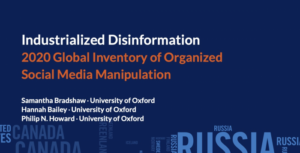 Democracies must recognize that we are in a geopolitical battle over the governance model that will dominate in the 21st century digital context, argues Eileen Donahoe (right), Executive Director of Stanford’s Global Digital Policy Incubator and a National Endowment for Democracy (NED) board member.
Democracies must recognize that we are in a geopolitical battle over the governance model that will dominate in the 21st century digital context, argues Eileen Donahoe (right), Executive Director of Stanford’s Global Digital Policy Incubator and a National Endowment for Democracy (NED) board member.
Now is the time to rally the world around a democratic vision of digital society. https://t.co/J6Wq6xLe44
— Democracy Digest (@demdigest) January 20, 2021
In a 51-minute video (above) posted on YouTube last month, the Russian opposition leader Alexei Navalny described in chilling detail how a secret service hit squad had poisoned him with the novichok nerve agent. He even telephoned one of them later and tricked him into describing how he smeared novichok on Navalny’s underpants, the subject of another video, the FT’s John Thornhill reports:
This extraordinary exposé was aided by Bellingcat, an open-source investigative agency founded by Eliot Higgins, a British researcher and citizen journalist. Using airline passenger manifests, telephone records, geolocation data and personnel files, all circulating on the darker recesses of the Russian internet, Bellingcat was able to piece together the plot to poison Navalny. Not only does Higgins antagonise the autocrats, he also takes aim at those who only bewail the downsides of the internet.
 “At Bellingcat, we do not accept this cyber-miserabilism,” he writes in We Are Bellingcat: An Intelligence Agency for the People. “The marvels of the internet can still have an impact for the better.”
“At Bellingcat, we do not accept this cyber-miserabilism,” he writes in We Are Bellingcat: An Intelligence Agency for the People. “The marvels of the internet can still have an impact for the better.”
Strong U.S. leadership is needed to develop a compelling democratic conception of digitized society and to rebuild the democratic alliance around a shared strategic technology agenda. To achieve these aims, the incoming administration should focus on five practical priorities, Stanford’s Donahoe writes:
- First, we must “get our own house in order” by ensuring that U.S. digital technology policy is consistent with human rights and democratic values. The level of attention to the normative dimensions of technology policy, as well as to investment in emerging technology, must adequately reflect its strategic importance to our security.
- Second, the digital policy rift with our transatlantic partners must be healed: without U.S.-EU alignment, other democratic partners will lose confidence that a democratic model for digital society is a realistic goal.
- Third, the democratic alliance must be rallied around a shared model for democratic governance of digital society and a strategic technology agenda. This democratic model must incorporate institutional constraints on both public and private sector use of data. It also will require further articulation of how government and technology companies apply and adhere to international human rights law and norms in the digital context.
- Fourth, we must compete with the digital authoritarian model of governance and develop a comprehensive strategy to combat it. Robust diplomacy in the international normative arena will be essential, both with respect to technical standards and protocols, and with respect to norms on use of data and technology.
- Fifth, the U.S. must reclaim the internet for citizens and humanity by investing in innovation and entrepreneurship in regions that have not been included in the digital revolution, both domestically and internationally. Investment in “E-Government” capacities to provide secure and efficient public services should be uncontroversial, as should investments in digital security tools for citizens, consumers and civil society actors…..
 Many of these themes are developed by Ronald J Deibert in Reset: Reclaiming the Internet for Civil Society, the FT’s Thornhill adds:
Many of these themes are developed by Ronald J Deibert in Reset: Reclaiming the Internet for Civil Society, the FT’s Thornhill adds:
As director of the Citizen Lab at the Munk School at the University of Toronto, Deibert explains how civil society can mobilise to loosen the state and corporate grip over the internet. Citizen Lab, which researches the intersection between technology and human rights, and many other civil institutions like it, can act as “counter-intelligence for global society”, he claims. However, both writers make clear that there will be no quick and simple solutions to the multiple challenges of the internet era. It will take a painstaking struggle over many years and across many domains to reclaim the internet for the people.
The problem, of course, lies in internet governance – namely, the absence of rules, says Stephen S. Roach, a faculty member at Yale University, former chairman of Morgan Stanley Asia, and the author of Unbalanced: The Codependency of America and China.
Even as we extol the virtues of the digital world, to say nothing of the acceleration of digitization during the COVID-19 pandemic, the dark side has become impossible to ignore, he writes for Project Syndicate. The Western model of open-ended connectivity has given rise to platforms for trade in illicit drugs, pornography, and pedophilia. It has also fueled political extremism, social polarization, and now attempted insurrection. The virtues of cyber-libertarianism have become inseparable from its vices. RTWT
 The manipulation of public opinion over social media remains a critical threat to democracy, according to a new report by the Oxford Internet Institute. Its 2020 report highlights the recent trends of computational propaganda across 81 countries and the evolving tools, capacities, strategies, and resources used to manipulate public opinion around the globe. It identifies three key trends in this year’s inventory of disinformation activity:
The manipulation of public opinion over social media remains a critical threat to democracy, according to a new report by the Oxford Internet Institute. Its 2020 report highlights the recent trends of computational propaganda across 81 countries and the evolving tools, capacities, strategies, and resources used to manipulate public opinion around the globe. It identifies three key trends in this year’s inventory of disinformation activity:
- Cyber troop activity continues to increase around the world. This year, we found evidence of 81 countries using social media to spread computational propaganda and disinformation about politics. This has increased from last years’ report, in which we identified 70 countries with cyber troop activity.
- Over the last year, social media firms have taken important steps to combat the misuse of their platforms by cyber troops. Public announcements by Facebook and Twitter between January 2019 and December 2020 reveal that more than 317,000 accounts and pages have been removed by the platforms. Nonetheless, almost US $10 million has still been spent on political advertisements by cyber troops operating around the world.
- Private firms increasingly provide manipulation campaigns. Over the last year, we found forty- eight instances of private companies deploying computational propaganda on behalf of a political actor. Since 2018 there have been more than 65 firms offering computational propaganda as a service. In total, we have found almost US $60 million was spent on hiring these firms since 2009.
Read the 2020 Cyber Troops report here, the Belarus case study here and the Costa Rica case study here.
What is the impact of #US #Capitolriots on the future of the #digitalspace?
Watch this week’s #DemocracyCalling! with @kateklingova and @DominHajdu to find out more.@demdigest @PolitiFact @Poynter @firstdraftnews @SecureDemocracy pic.twitter.com/qxEkMHxKy0
— GLOBSEC (@GLOBSEC) January 20, 2021







